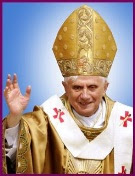For if the lineal succession of bishops is to be taken into account, with how much more certainty and benefit to the Church do we reckon back till we reach Peter himself, to whom, as bearing in a figure the whole Church, the Lord said: Upon this rock will I build my Church, and the gates of hell shall not prevail against it! [Matthew 16:18] The successor of Peter was Linus, and his successors in unbroken continuity were these:— Clement, Anacletus, Evaristus, Alexander, Sixtus, Telesphorus, Iginus, Anicetus, Pius, Soter, Eleutherius, Victor, Zephirinus, Calixtus, Urbanus, Pontianus, Antherus, Fabianus, Cornelius, Lucius, Stephanus, Xystus, Dionysius, Felix, Eutychianus, Gaius, Marcellinus, Marcellus, Eusebius, Miltiades, Sylvester, Marcus, Julius, Liberius, Damasus, and Siricius, whose successor is the present Bishop Anastasius. In this order of succession no Donatist bishop is found. But, reversing the natural course of things, the Donatists sent to Rome from Africa an ordained bishop, who, putting himself at the head of a few Africans in the great metropolis, gave some notoriety to the name of mountain men, or Cutzupits, by which they were known.
--St. Augustine, Letter 53, 1:2







